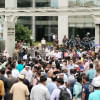Businesses fret about NBR deadlock, seek quick end

Leaders of the country's top business chambers and trade bodies yesterday expressed deep concern over the ongoing work stoppage by the National Board of Revenue (NBR) officials, which has brought export and import activities to a standstill due to suspended customs operations at ports.
They called for an immediate resolution to the standoff, urging intervention from the Chief Adviser's Office to restore normal business operations.
Speaking at a joint press conference in Dhaka yesterday, industry leaders from apparel, pharmaceuticals, leather goods, textiles, and accessories raised alarm over the mounting financial losses and operational gridlock caused by the shutdown.
They warned that prolonged disruption would have serious economic consequences.
For instance, the garment sector alone is facing trade disruptions worth more than $230 million per day, as the movement of goods and raw materials through Chattogram port, land ports, and airports remains blocked due to the nationwide shutdown by revenue officials.
Exporters and raw material importers fear further setbacks, especially in the apparel sector, where international buyers demand swift delivery and uninterrupted production.
Apparel exporters said their export-oriented goods are lying at the ports, exposed to the elements. With no customs clearance, quality is deteriorating.
To meet deadlines, they said they might be forced to use costly air shipments, while delays in clearing raw materials would reduce factory output.
At the press conference, Mahmud Hasan Khan Babu, president of the Bangladesh Garment Manufacturers and Exporters Association (BGMEA), said that the annual value of garment exports and imports crosses $65 billion.
"This huge business is now suffering heavy losses," Babu said. "If we fail to export garments on time or release raw materials from the ports, factories will not be able to pay workers. That could lead to a serious law and order issue."
"It is a matter of our existence. We want an immediate solution to this impasse," added the BGMEA president.
Delivering the joint statement, Anwar-Ul-Alam Chowdhury (Parvez), president of the Bangladesh Chamber of Industries (BCI), also urged an immediate end to the stalemate at the revenue authority.
He called for improved and hassle-free business services from the NBR, with greater transparency and accountability.
The BCI president appealed to the highest level of government, involving the finance, commerce, and industries ministries, to resolve the crisis as soon as possible.
Mahbubur Rahman, president of the International Chamber of Commerce Bangladesh, said dialogue between businesses and the interim government had broken down, leaving many issues unaddressed.
"The NBR officials are not trade union members. They cannot continue this strike indefinitely. It is unacceptable," Rahman said. "If they do not resume customs clearance by tomorrow [Sunday], our export and import operations will come to a halt."
"It is a suicidal decision by the NBR officials. Our situation is so critical now that our back is against the ropes," Rahman added.
He said reforms at the NBR had long been overdue, as suggested by multilateral lenders such as the World Bank and the International Monetary Fund (IMF).
"We always wanted a time-befitting, honest, and transparent NBR which echoes with the ease of doing business. NBR reforms are essential and we have full support for it," he said.
Syed Nasim Manzur, president of the Leathergoods and Footwear Manufacturers and Exporters Association, said they always wanted an inclusive discussion to shape the reform process.
"The opinion of the stakeholders should be sought through holding discussions on what would be the procedure for reforms and how it will take place. We think it is possible to find a solution," said Manzur.
He added that there are committed officers in the revenue authority. "We know in the NBR there are honest, patriotic, and hard-working officers. What would be their future? It is a legitimate question whether the NBR would be dissolved; it should have space for discussion."
He said the crisis affects not just exports but also imports, including pharmaceuticals and essential goods for domestic consumption.
"The NBR crisis has come at a time when businesses were just beginning to recover from global volatility. Markets will not wait for Bangladesh," said the footwear entrepreneur. "It will bring disaster to the country's business. It is a matter of survival for us."
Manzur said he was unaware of any similar incident happening anywhere in the world unless triggered by war.
Showkat Aziz Russell, president of the Bangladesh Textile Mills Association (BTMA), said businesses had long felt hostage to the NBR. Referring to the ongoing strike, he said, "This is nothing but a distribution of power and money."
"We are becoming the victims of their trouble. They always disturbed us. And now they are disturbing the government. They will cause suffering to the entire nation. We want them to stop the movement," Russell said.
Kamran T Rahman, president of the Metropolitan Chamber of Commerce and Industry, and its vice-president Simeen Rahman were also present at the briefing.
Mir Nasir Hossain, former president of the Federation of Bangladesh Chambers of Commerce and Industry; A Matin Chowdhury, former president of BTMA; and Fazlee Shamim Ehsan, executive president of the Bangladesh Knitwear Manufacturers and Exporters Association, also attended the programme.

 For all latest news, follow The Daily Star's Google News channel.
For all latest news, follow The Daily Star's Google News channel. 







Comments